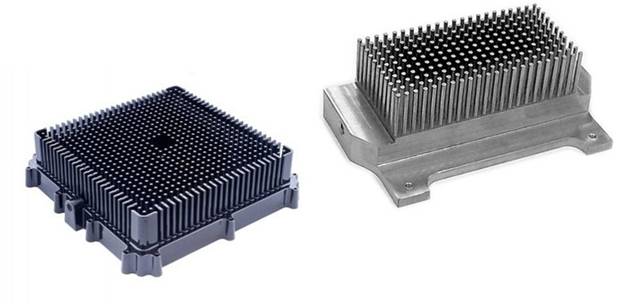When it comes to efficient thermal management, one size does not fit all. Effective heat dissipation presents a variety of requirements and difficulties across various industries and applications. Here, specialized heat sinks are essential. Custom heat sinks are created with care to meet the precise thermal requirements of a given application. Custom heat sinks provide unmatched thermal performance, dependability, and efficiency because they can be made to meet specific needs. The significance of custom heat sinks and how they offer specialized thermal management solutions will be discussed in this article.
Understanding Custom Heat Sinks
Custom heat sinks are heat-dissipating devices that are designed and manufactured to match the specific thermal requirements of a particular application. Unlike standard heat sinks that are mass-produced and have limited design variations, custom heat sinks are created through a collaborative process between heat sink manufacturers and their clients. This collaborative approach ensures that the heat sink design aligns perfectly with the application’s thermal profile, power requirements, physical constraints, and environmental factors.
Tailoring Thermal Solutions
The key advantage of custom heat sinks lies in their ability to be tailored to specific needs. Let’s explore some of the ways in which custom heat sinks can be customized to provide optimal thermal management solutions:
● Optimized Geometry
Custom heat sinks can be designed with precise fin geometries, such as fin height, thickness, spacing, and shape, to maximize surface area and airflow. This optimization allows for efficient heat dissipation and improved cooling performance.
● Material Selection
Custom heat sinks offer flexibility in material selection. Different materials, such as aluminum, copper, and their alloys, have varying thermal conductivity, weight, and cost characteristics. By selecting the most suitable material for a specific application, custom heat sinks can achieve optimal heat transfer and cost-effectiveness.
● Finishing and Coatings
Custom heat sinks can be coated or finished with specialized treatments to enhance their thermal performance. Treatments such as anodization, electroplating, or chemical coatings can improve corrosion resistance, increase emissivity, and reduce surface roughness, thereby enhancing overall heat dissipation.
● Integration with Other Components
Custom heat sinks can be designed to seamlessly integrate with other components of the application, such as electronic devices or power modules. This integration ensures efficient heat transfer and minimizes thermal resistance between the heat sink and the heat source.
● Advanced Manufacturing Techniques
Custom heat sinks benefit from advanced manufacturing techniques such as CNC machining, extrusion, skiving, and additive manufacturing. These techniques enable intricate designs, complex geometries, and tight tolerances, resulting in highly efficient heat sinks that meet specific thermal requirements.
Applications of Custom Heat Sinks
The versatility of custom heat sinks allows them to be utilized in a wide range of industries and applications. Here are a few notable examples:
● Electronics
Custom heat sinks are extensively used in the electronics industry to cool components such as CPUs, GPUs, power amplifiers, and LED drivers. These heat sinks effectively dissipate heat generated by electronic devices, ensuring optimal performance and longevity.
● Automotive
The automotive industry relies on custom heat sinks for cooling power electronics, electric vehicle battery packs, motor controllers, and thermal management of internal combustion engines. Custom heat sinks play a critical role in maintaining the optimal operating temperature of automotive components, enhancing efficiency and reliability.
● Renewable Energy
Custom heat sinks find applications in renewable energy systems such as solar inverters, wind turbine converters, and energy storage systems. These heat sinks assist in dissipating heat generated by power electronics, ensuring continuous operation and efficient energy conversion.
● Telecommunications
In the telecommunications industry, custom heat sinks are used to cool high-power transmitters, routers and data centers. These heat sinks effectively manage the heat generated by the high-power equipment, preventing overheating and maintaining stable performance.
● Medical Devices
Custom heat sinks play a vital role in thermal management for medical devices such as diagnostic equipment, imaging systems, and laser systems. These heat sinks ensure that the sensitive components of medical devices operate within safe temperature limits, guaranteeing accurate results and patient safety.
● Aerospace and Defense
In aerospace and defence applications, custom heat sinks are used to cool avionics systems, radar equipment, power electronics, and communication devices. These heat sinks withstand extreme temperatures and harsh environments, ensuring reliable operation and longevity of critical equipment.
Benefits of Custom Heat Sinks
By opting for custom heat sinks, businesses and industries can benefit from the following advantages:
● Optimal Thermal Performance
Custom heat sinks are designed specifically for a particular application, taking into account its unique thermal requirements. This ensures efficient heat dissipation and maximum cooling performance, preventing overheating and ensuring the longevity of components.
● Space Efficiency
Custom heat sinks can be designed to fit within the available space constraints of the application. Whether it’s a compact electronic device or a complex industrial system, custom heat sinks can be tailored to optimize space utilization and minimize the footprint while still delivering effective thermal management.
● Improved Reliability
Custom heat sinks are engineered to match the thermal profile and power dissipation characteristics of the application. By effectively managing heat, they help maintain the stability and reliability of critical components, reducing the risk of system failures, downtime, and costly repairs.
● Cost-Effectiveness
Although custom heat sinks may involve upfront design and manufacturing costs, they offer long-term cost savings. By precisely meeting the thermal requirements, custom heat sinks prevent over-engineering and excessive cooling measures, thereby reducing energy consumption and overall system costs.
● Enhanced Product Performance
Efficient thermal management provided by custom heat sinks ensures that electronic devices, power electronics, and other components operate within their optimal temperature ranges. This leads to improved performance, increased operational efficiency, and extended product lifespans.
Collaboration with Custom Heat Sink Manufacturers
The process of developing custom heat sinks involves close collaboration between the application developers and heat sink manufacturers. Here are the key steps involved in the collaboration process:
● Requirements Analysis
The application developers communicate their thermal requirements, power dissipation levels, spatial limitations, and any other specific considerations to the heat sink manufacturer. This information forms the foundation for designing the custom heat sink.
● Design Concept and Iteration
Based on the requirements analysis, the heat sink manufacturer creates initial design concepts. These concepts are shared with the application developers for feedback and further refinement. This iterative process continues until a final design is approved.
● Prototyping and Testing
Once the design is finalized, the heat sink manufacturer produces prototypes of the custom heat sink. These prototypes undergo rigorous testing to evaluate their thermal performance, reliability, and compatibility with the application.
● Manufacturing and Production
Upon successful prototype testing, the custom heat sink moves into the manufacturing phase. The heat sink manufacturer utilizes advanced manufacturing techniques to produce custom heat sinks in the desired quantities.
● Integration and Support
The heat sink manufacturer provides assistance with the integration of the custom heat sink into the application, ensuring proper installation and compatibility. Ongoing technical support and maintenance services are also offered to address any future needs or concerns.
Conclusion
Custom heat sinks offer an unparalleled level of thermal management tailored to the specific needs of various industries and applications. By optimizing geometry, material selection, finishing, and integration, custom heat sinks deliver superior thermal performance, space efficiency, and reliability. They find applications in electronics, automotive, renewable energy, telecommunications, medical devices, aerospace, and defense industries.







